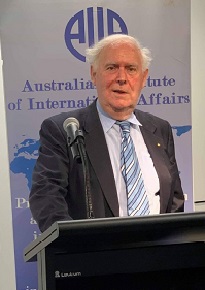Brexit drama and chaos damages British politics

The bewildering Brexit mess engulfing the United Kingdom was dissected in stark detail when Professor Patrick Weller addressed AIIA Queensland on October 22. His presentation had been intended to offer a retrospective look at whichever resolution the British Government had reached on its great political dilemma. But as Professor Weller put it, where we thought we’d have answers, there is still chaos for which “nobody knows the outcome” and those who claim to know, he says, attempt to predict the course of an “out of control train”.
The seminar outlined the significant damage to Britain’s once envious parliamentary system and democracy. Among the casualties is the core of Westminster as a sovereign parliament, which is conventionally headed by a powerful prime minister with convincing control of the house, backed by disciplined parties. The result is a sort of elected dictatorship which, Professor Weller reminds us, is a foundation of Britain’s political effectiveness and pragmatism.
Now, he claims the British Government is “gridlocked, dysfunctional, [and] unclear”. And the British Parliament, having had no single moment, no independence day, crisis point or revolutionary instance is not governed by a legal constitution. Its behavior, and that of its politicians, is moderated instead by political conventions. The disruption of these conventions, according to Professor Weller, explains the chaotic situation at hand.
One threatened convention, explicitly mentioned, is the “good chap” theory. It is the notion of self-restraint necessary to practice politics under a system not governed by a single legal constitution. Because although these conventions are obligatory and binding, their formulation comes through practice. The British constitution is “no more or no less than what happened”, and the “good chap” is relied on to show self-restraint to ensure this institution’s productive but fluid development.
How then, Professor Weller asks, are we to understand the actions of PM Boris Johnson in an environment guided by moral but not legal force? Because conventions are formulated through practice, they are contested similarly and with this comes a convenient lack of definition. This is convenient, in particular, for a leader, like Johnson, with little self-restraint and the Trumpian approach of “might is right”. Professor Weller says, “he’s rewritten the book on what we expect from prime ministers”.
Of course, the talk also touched on numerous other conventions which seemingly have been systematically challenged, dismantled or disrupted since the Brexit vote in 2016. Of particular concern to Professor Weller is the creeping involvement of the courts in political affairs. He also cites the polarisation and dysfunction of internal party politics as pushing its members “to the wings” of the political spectrum. And he carefully reminds us that this is not the first general vote on Britain’s relationship with Europe.
Acknowledging his opening remarks regarding Brexit predictions, Professor Weller foresees an impending resolution, due less to the effectiveness of parliament rather than the Brexit-fatigue experienced by the British people. Nonetheless, this new cynical and toxic nature to British politics is of concern to Professor Weller. In his opinion, “Brexit has irreversibly changed the nature of Britain’s politics and parliament, and I don’t believe for the better”.
Patrick Weller is professor emeritus at Griffith University. He was professor of politics there from 1984 to 2015. He has written extensively on Australian politics and executive government . The most recent book is The Prime Ministers’ Craft ( Oxford University Press, 2018). It was nominated as Times Higher Education’s “Book of the Week” in August 2018